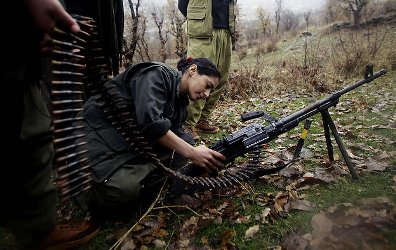
The devastating airstrike yesterday against Kurdish smugglers in northern Iraq, which left at least 31 Kurds dead, marks the latest operation conducted by Turkish security units against the Kurdistan Workers’ Party (PKK). After an unmanned reconnaissance drone tracked what appeared to be armed PKK guerrillas traveling from the northern Iraqi villages of Ortasu and Gulyazi toward the Turkish border, Turkish soldiers blocked the entrance routes until at least four attack jets bombed and strafed the suspected guerrilla column.
Shortly afterward, a senior member of the governing Justice and Development Party said early evidence suggested that those killed were civilians, family members who were attempting to smuggle cigarettes across the border, according to CNN. Subsequently, thousands of pro-Kurdish protesters took to the streets of Istanbul, clashing with police before being dispersed by water-cannons and tear gas.
The deadly air raid follows a month-long offensive carried about by Turkish military and police units against PKK guerrilla fronts throughout southeastern Turkey. On Dec. 23, security units uncovered the largest bunker system belonging to the PKK in the decades-long conflict between the Turkish state and PKK rebels. After capturing two PKK insurgents, Zildan and Şiyar, in the vicinity of Görese Mountain, located near Diyarbakır’s Dicle, Turkish forces were led to a sophisticated deep underground bunker used by the PKK.
According to a Today’s Zaman report:
During the interrogation of the militants, Zildan and Şiyar gave the location of the largest underground bunker of the PKK, which has an administration room, a training room, two rooms large enough to sleep 15 people, two stock rooms with five tons of food, 150 meters of fabric, 10 sweat suits, 50 pairs of shoes, two generators, a sewing machine, various medicines and many day-to-day items.
Security forces also found two Kalashnikov rifles, hundreds of bullets, a radiophone, and an undisclosed amount of dollar bills and some documents pertaining to captured militants.
Additional security operations throughout Turkey’s Bingöl province have so far resulted in the arrest of 16 PKK suspects, including three muhtars (village heads). Among those arrested was a longtime fugitive and top PKK commander, codenamed ‘Serkeş,’ described as a “high-level member of the terrorist group who had been part of the [PKK] organization for 17 years.” He was reportedly responsible for the mountainous region of Aladağlar. In November, Turkey launched a series of operations against the PKK in northern Iraq and the Kavaklı and Kazan camps in the southeastern Turkish province of Hakkari, where the death toll of PKK guerrillas reached 300.
Despite the diplomatic fallout that will likely follow from yesterday’s deadly errant air raid in northern Iraq, the Turkish military is prepared to continue its military campaign against PKK rebels in both southeastern Turkey and northern Iraq. Turkey’s deputy Prime Minister Besir Atalay previously warned that Turkey’s winter operations against the PKK “will continue, [and] there is not, and there will not be, any pause.”
Are you a dedicated reader of FDD's Long War Journal? Has our research benefitted you or your team over the years? Support our independent reporting and analysis today by considering a one-time or monthly donation. Thanks for reading! You can make a tax-deductible donation here.








2 Comments
time for the PKK to seriously damage ‘The Pipe Line,’ the Bosphorus bridges & pull a Mumbai style assault in Istanbul & Ankara
Smuggling in a terrorism/war zone is inevitably dangerous. I’m suprised this sort of thing doesn’t happen more often, especially on the Afghanistan/Pakistan and Afghanistan/Iran borders.